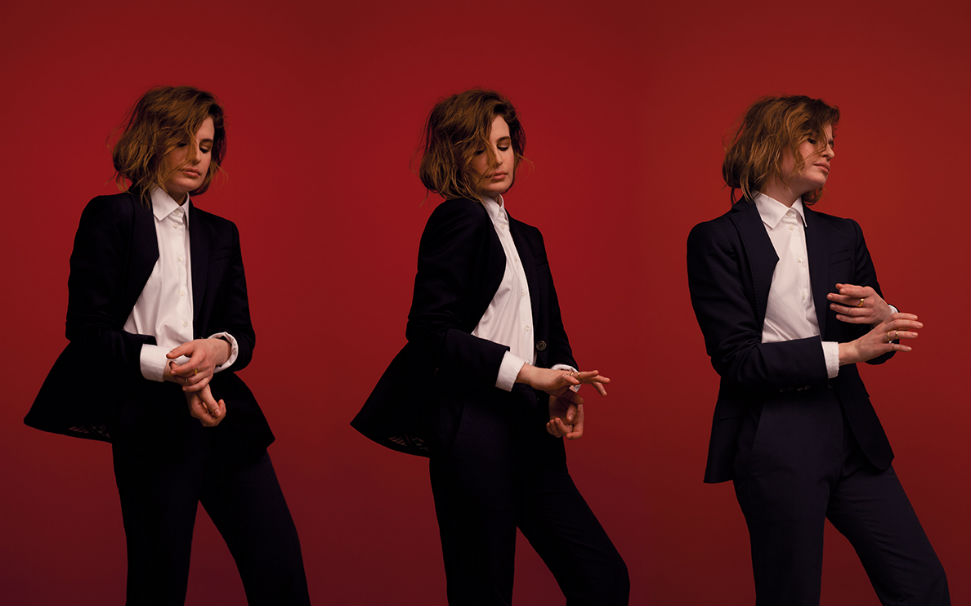More about: Christine And The Queens
“Faces are... disturbing.” As we sit opposite one another in a busy London hotel, Christine & The Queens is staring at mine.
I shift awkwardly in my seat. “I love faces!” she adds quickly, “but the concept of having a face is disturbing. I would love the idea of not having a face, and switching faces every day, like, Monday face, Tuesday face. I actually kind of understand the... I wouldn't change my face like Michael Jackson, but I get it. I understand it." ”
It wasn’t a physical discomfort that led Heloise Letissier to create the character of Christine & The Queens half a decade ago, though, but an emotional one. In an attempt to distance herself – literally as well as emotionally – from a painful heartbreak, she travelled to London, alone, from her native France. One evening, a chance encounter with some empathetic drag queens at Madame Jojo’s sparked the birth of Christine.
It was an effort not to create a new self, but to bring to the surface the one she’d never had the courage to show the world. Christine still finds herself switching between characters – one moment bold and self-confident, the next shy and nervous – but that’s not, she says, an unusual phenomenon.
“I'm always obsessed with watching people behaving differently in different situations,” she explains. “Like, I remember my father sometimes, when he picks up the phone, he's actually speaking in a lower tone to be more masculine. Tiny, tiny things like that.” It doesn’t surprise me that she’s fascinated by the minutiae of human behaviour. Throughout our conversation, Christine is shrewdly perceptive; quietly – but with no motive other than a warm and genuine interest - weighing me up. At one point, she says, “You're an introvert right? Yeah, I got you.”
It’s this innate ability to engage with the world, while at the same time observing it as an outsider, that makes Christine & The Queens’ music so accessible, and yet so palpably other. Even her moniker is something of a paradox – Christine is a character, yes, but she’s also more authentic than Heloise could ever allow herself to be. “Some journalists like to use your real name, like, ‘Christine & The Queens, AKA Héloïse Letissier’, as if it was a revelation,” she laughs, “whereas for me, Christine is the truest, boldest version of myself, and I'm actually glad she got to meet people properly. I'm more myself when I'm Christine. It’s like an excuse [for] shy people to actually be more free.”
To her, explicitly creating a ‘character’, through which she can express a particular version of herself, is no different to her father changing his voice when he picks up the phone. She’s simply embracing the multiplicity of identity with a little more fervour. After all, before Christine, “I was already constructing identities, but I was just trying to please other people. With Christine, it's just about trying to please myself and to be myself.” She pauses. “Whatever that means. It changes all the time, you know?”

Photo: Jeff Hahn
Indeed, Christine’s identity – how she perceives and presents her own gender and sexuality, for example – is a fluid and changeable thing. In the song ‘iT’ (“I wrote it in a fancy way because the T looks like a dick”), which is taken from her beautiful debut album Chaleur Humaine, she sings repeatedly, and with an ever increasing tone of conviction, “I’ve got it. I’m a man now.” She enjoys watching the look of mild shock and confusion on people’s faces when she performs it live, but the song was borne as much out of anger as it was playfulness.
“I was tired of being a young girl I guess, for many reasons,” she explains. “I felt like my life would be easier if I was... if I had a dick. Because you could be a boss, you could be the one who desired, you could be ugly if you wanted. You have privilege when you're a man you don't have when you're a girl, so [the song] was me wishing desperately I could be a man.”
“Actually it's funny, because at some point I really wanted to be a man. Now it's shifted a bit. Now I'd rather stick with being a girl, to fight for it to be exactly like being a man. I love feminine and beautiful women, and powerful women, but I don't relate with being sexualised like that. I have a more queer sexuality, so it was about inventing this figure as well.”
Sometimes, the way Christine presents herself – often in dark tailored trouser suits or buttoned-up shirts – is held up as an ideal, a means by which to put down other female musicians. During one interview, a journalist compared her favourably to Miley Cyrus. “That was awkward,” she recalls. “They were like, 'So you're a good feminist, not like this-', and I was like, 'You know, I actually like Miley Cyrus. I liked when she had a strap-on. It was great. I love seeing Beyonce's thighs. She feels great like that. You're not being a feminist by saying to her how she should dress.’”
It’s a pervasive attitude in today’s culture - that the respect women deserve should be measured by how strongly they express their sexuality, or how little they wear. Just this week, Amber Rose had to explain to Run-D.M.C.’s Rev Run the absurdity of his belief that women should “dress as they want to be addressed.”
Because it’s not as if putting on a suit has liberated Christine from the male gaze. “I'm objectified as well,” she says, firmly. “Even wearing a suit, some people are still discussing whether they want to fuck me or not. ‘What do you think she's like under there?' You can't escape it. You can't escape it. I think the real fight is to have many, many versions of many women, and to actually accept that women can be different things, like sluts and bosses and mothers. Sometimes people just want one version of women, like, 'Oh you're the suit one. So you don't have any sexuality'. Yes I do.”

Photo: Jeff Hahn
“Once we free women of stereotypes,” she continues, “we can free men as well. Men will be allowed to cry in public, and actually be queer and feminine. Some guys like Young Thug make me believe in the fragile thug, the feminine thug. I'm waiting for gender-fluidity to actually rule the world and then we can all be free.”
When it comes to playing with ideas of gender, by way of “alienesque shape-shifting,” there are few artists Christine admires (or, in her own words, “stalks”) more than FKA twigs. The two share a passion for the physicality of performance, their videos and live shows embedded with twitchy dance moves, their lyrics exploring and disturbing the tropes of gender.
“She’s a shape shifter. Playing with femininity and becoming a monster. I'm not overly sensual like her, I'm like the weird cousin,” she laughs, a joyous, staccato punctuation mark that erupts throughout our conversation. “The sick one, leaving the table to go on Tumblr.”
Christine & The Queens' debut album, Chaleur Humaine, is out in the UK today (26 February).
More about: Christine And The Queens



